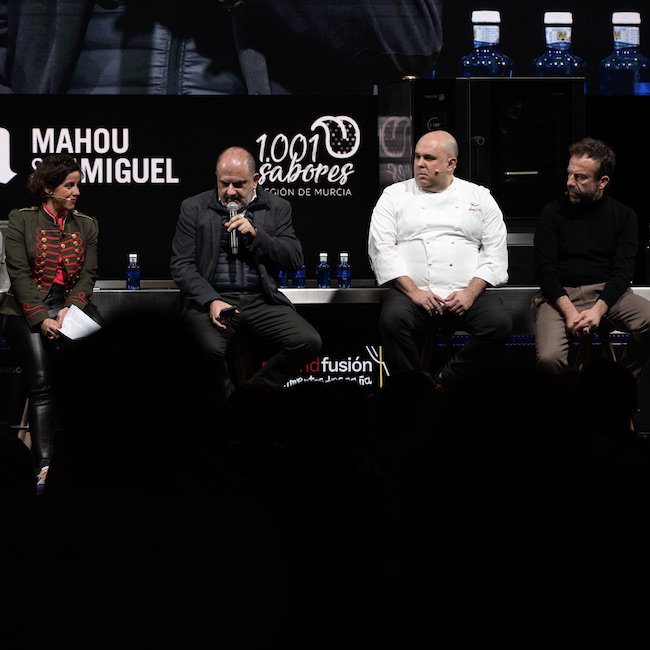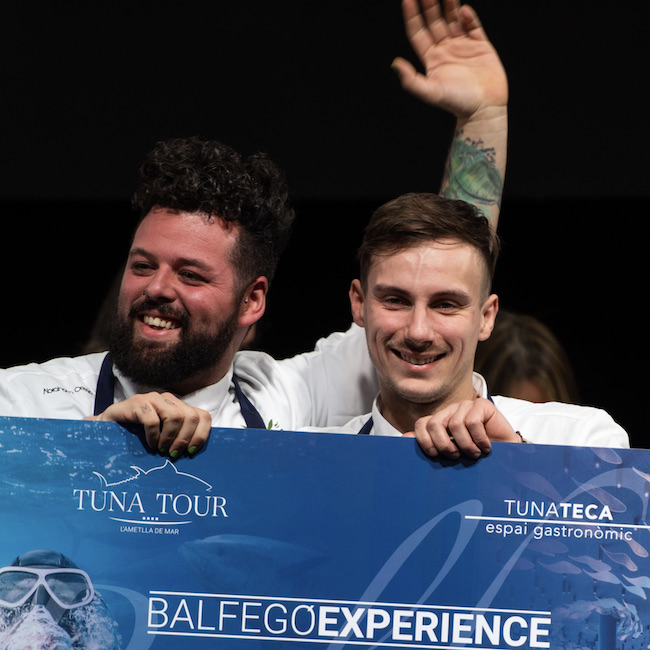.png.transform/rendition-xs/image_image%20(1).png)
Madrid Fusión Alimentos de España 2023 - Great Chefs Stretching Limits
No limits: the gastronomic event reflects the vitality of Spanish cuisine through presentations and roundtable discussions with an eye on the future
Using fish scales to make desserts: it's hard to go much further in a desire to research and create, and it's also difficult to find a better symbol of this edition of Madrid Fusion Alimentos de España 2023. Ángel León (Aponiente, El Puerto de Santa María, 3 Michelin stars) was one of the chefs whose presentation fully aligned with the theme, "No limits," of this year's event, the 21st edition of the most important gastronomic event in Spain.
Ángel León once again left the auditorium spellbound by his technical feats, with other highlights such as popcorn made from fish eyes. Another expert in pushing the limits of haute cuisine is Andoni Luis Aduriz (Mugaritz, San Sebastián, 2 Michelin stars), who opened the event with a quick look at the creative processes at his restaurant, which will be 25 years old in 2023: his presentation highlighted everything from his iconic edible stones to the "fingers" with which he shocks diners on his latest menu. "Things don't always work out, and they certaintly don't always work out the first time," said the chef.

In addition to the creative frontiers, the conference also put a face to those chefs capable of developing a gastronomic proposal with an entirely Spanish flavor around the world and with restaurants bearing the Restaurants from Spain certification, a tool to recognize authentic ambassadors of Spanish cuisine worldwide. Danny Lledó (Xiquet, Washington, 1 Michelin star), Martí Carles Martínez (Gaig, Singapore), and Nacho Manzano (Ibérica, different locations in the United Kingdom) exchanged views on their experience. "Spanish gastronomy in the US is branded well, and we're trying to create a new experience for the high-end audience. They are demanding," Lledó noted, summing up a changing trend regarding Spanish gastronomy worldwide: certified quality for growing demand for quality.
Overcoming limits, sometimes mental limits, that prevent chefs from making the most of each of the products they work with was a theme in many of the presentations. Ricard Camarena (Ricard Camarena, Valencia, 2 Michelin stars) shared recipes to make the most of orange peels and to take advantage of an unfavorable pumpkin harvest. In a similar vein, the Roca brothers (El Celler de Can Roca, Valencia, 3 Michelin stars) showcased their liquid cuisine, Esperit Roca, with which they continue to address the environment "with respect and in a sustainable way," approaching the territory with a "genuine, very pure, and minimalist" view.
Far away places
Never before has an edition of Madrid Fusión had such a clear commitment to allowing attendees to travel, and they were transported to faraway places by chefs who have created projects that make their distant location a defining feature. The most radical example is that of Poul Andrias Ziska, who runs Koks in the Faroe Islands and Greenland, the world's most remote restaurant with two Michelin stars, and who makes use of everything nature has to offer: creativity and limits, together again.
Also far away, in the Peruvian Andes, at an altitude of 3,800 meters, is Mil, a project run by local chef Virgilio Martínez, his wife Pía León, and his sister Malena Martínez. There they have created a unique experience based on a link with the indigenous communities to explore the thousand and one faces of an infinite gastronomy.

The faces of the future of Spanish gastronomy
Although Madrid Fusión looked to the past and paid tribute to those who have defined Spanish gastronomy—such as the Arbelaitz brothers, who ran the now-closed Zuberoa—it also focused on the future, through contests and competitions. One person always worth following is the best new chef: an award that, in previous editions, has gone to names like Dabiz Muñoz and Ricard Camarena. On this occasion, the winners were Javier Rivero and Gorka Rico, from Ama restaurant in Tolosa (Guipúzcoa): they’ll have to be followed in the future. It's also worth highlighting the best new pastry chef, a distinction that went to Noelia Tomoshige (Monroebakes, Getafe, Madrid).
Another competition that always generates great excitement was the best Iberico ham croquette, which went to the Ababol restaurant in Albacete. Additionally, Ancestral restaurant (Illescas, Toledo), won the best escabeche, which they prepare with frogs' legs. A centuries-old technique that looks toward the future.

Liquid excellence
At Madrid Fusión, people not only eat, but they also drink, and wines and cocktails are accounting for an increasingly larger portion of the gastronomic conference. At The Wines Edition Wines from Spain, sponsored by Food & Wines from Spain, there were presentations on granite soils (and the character they give to wines), how winemakers are increasingly connecting with the land, and even the intricate and surprising links between music and oenology. All this was presented by leaders such as Josep 'Pitu' Roca; Pedro Ballesteros, Master of Wine; Almudena Alberca; and important sommeliers like Ferran Centelles.
On the bottom floor of the event, there was also a space dedicated to mixology with The Drinks Show, which continues to thrive and to highlight how cocktails have ceased to be simply an addition to a meal but, on many occasions, an element that battles for protagonism. Or, rather, it joins forces to give shape to a gastronomic universe capable of breaking down any barriers in front of it. Goodbye, limits, goodbye.

